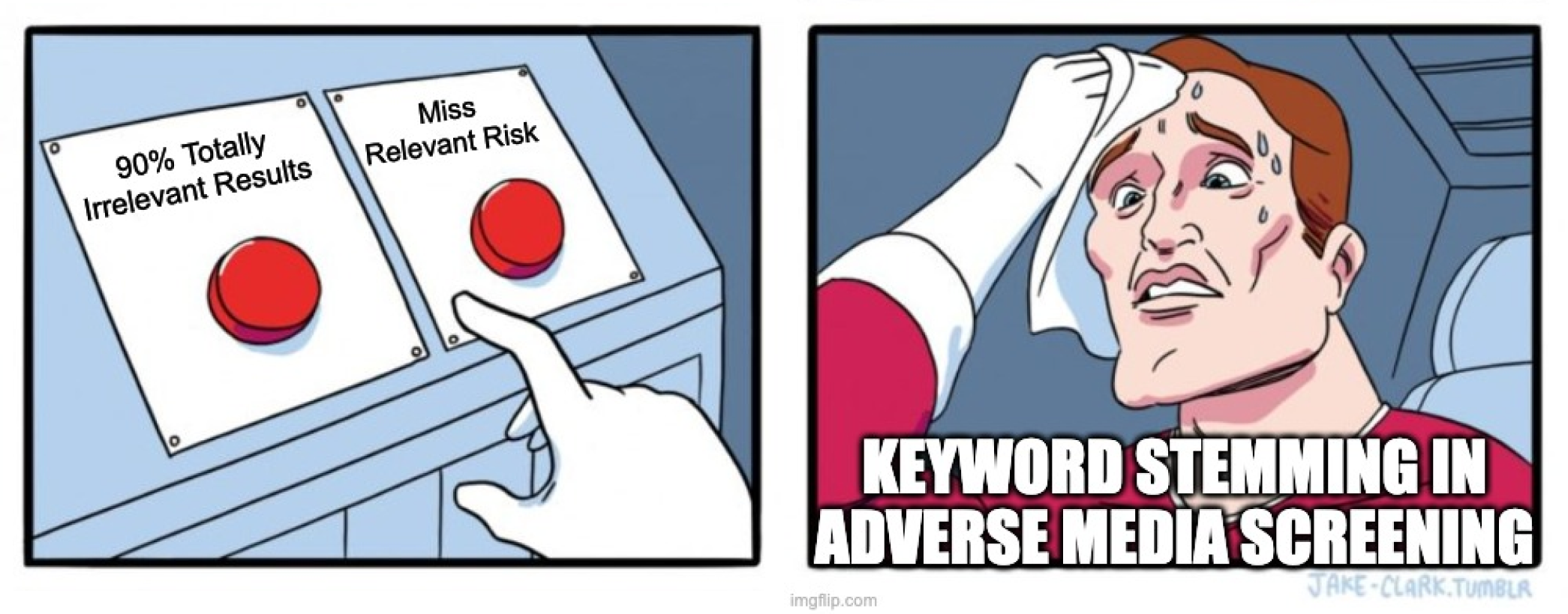Tim Backhaus
Learn how stemming can boost your adverse media screening efficiency! Discover what stemming is, how it expands search results, and strategies to balance precision and recall.

In the high-stakes world of adverse media screening, missing a crucial piece of information can have severe consequences. Enter stemming: a powerful linguistic technique that can revolutionize your search efficiency. But what is stemming, and how can you leverage its potential while avoiding common pitfalls? Let’s dive in.
Stemming is a process that reduces words to their root form. For instance:
This seemingly simple concept has profound implications for search efficiency, allowing search engines to capture a broader range of relevant results without requiring exact word matches.
Imagine conducting an adverse media search for “bribery.” With stemming, your search automatically expands to include:
This expanded scope can uncover crucial information that might otherwise slip through the cracks, potentially making the difference between a comprehensive screening and a critical missed risk.
While stemming can dramatically improve search results, it’s not without challenges. Consider this scenario:
You’re searching for information about a company being “fined.” Stemming reduces “fined” to “fine,” which could flood your results with irrelevant hits about:
Suddenly, pertinent information about financial penalties is drowning in a sea of unrelated content.
While stemming can be a powerful tool, it presents a unique challenge when applied to multi-keyword phrases. Let’s examine this phenomenon:
Consider the phrase “forced labor”. When stemming is applied to both words, we end up with a multitude of variations:
This creates a staggering 48 possible combinations, such as “forceful laborious,” “force laborer,” and of course, " forced labor." The problem? Only one of these combinations is actually used in the context we’re searching for, while the rest introduce noise and false positives.
To maximize the benefits of stemming while minimizing its drawbacks, follow these strategies:
Most search engines (like Google or Bing) and unstructured adverse media screening tools allow you to control stemming using quotation marks. Here’s how:
1. With stemming:
(Tim Backhaus) AND (fined OR bribe)
This search will include variations of “fined” and “bribe.”
2. Without stemming:
(Tim Backhaus) AND ("fined" OR "bribe")
This search will only look for exact matches of “fined” and “bribe.”
3. Recommended approach:
(Tim Backhaus) AND ("fined" OR "fines" OR bribe)
This search stems “bribe” but not “fined”, balancing precision and recall. It’s crucial to manually add important word variations (like “fines”) to ensure they’re not missed.
In the world of adverse media screening, the goal is not just to cast a wide net, but to cast a smart one. By thoughtfully applying stemming techniques, you can transform potential information overload into actionable intelligence. Start implementing these strategies today, and watch your screening efficiency soar.
Remember: In adverse media screening, it’s not just about finding more information—it’s about finding the right information.